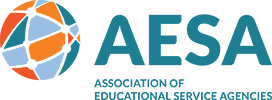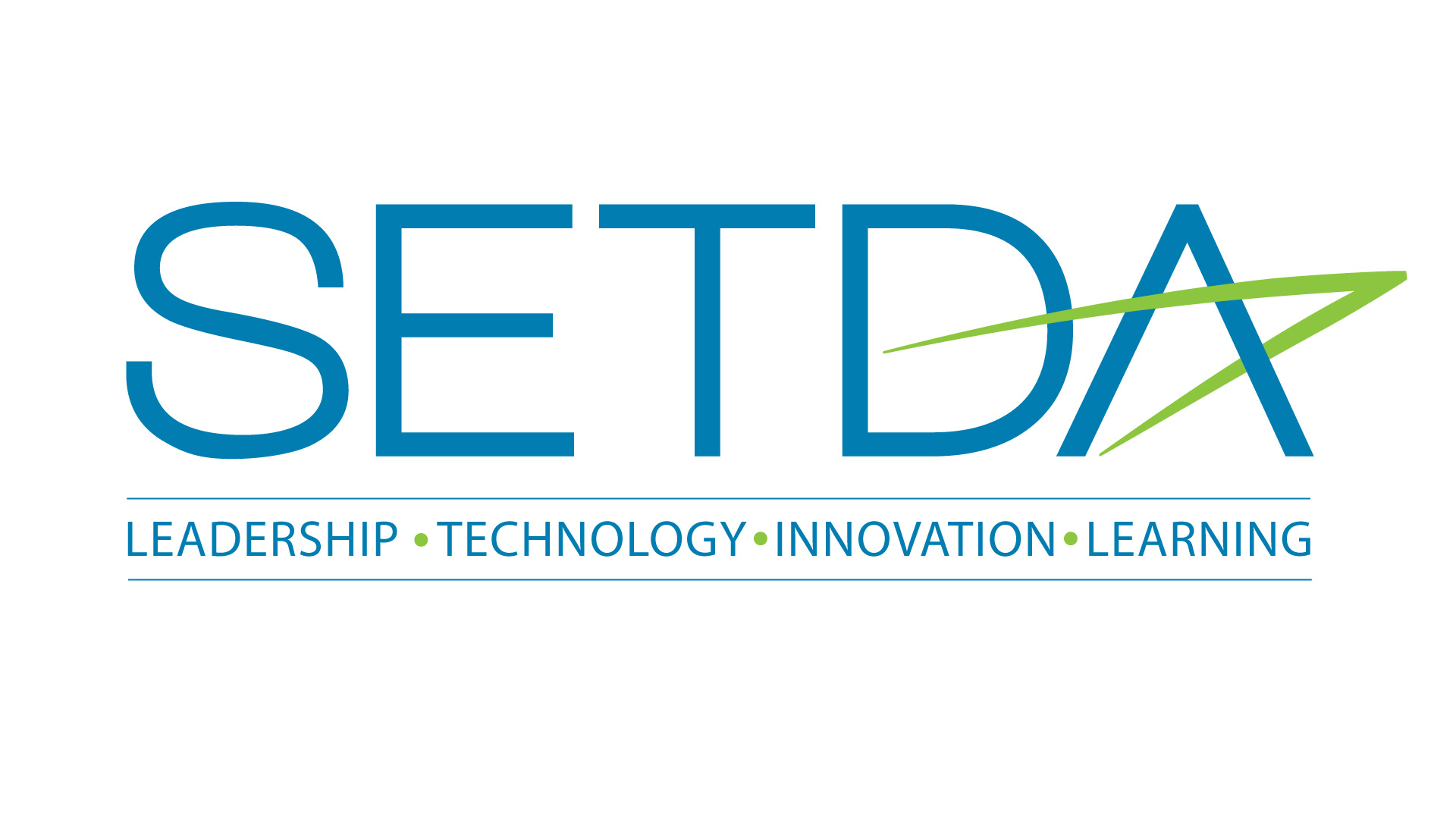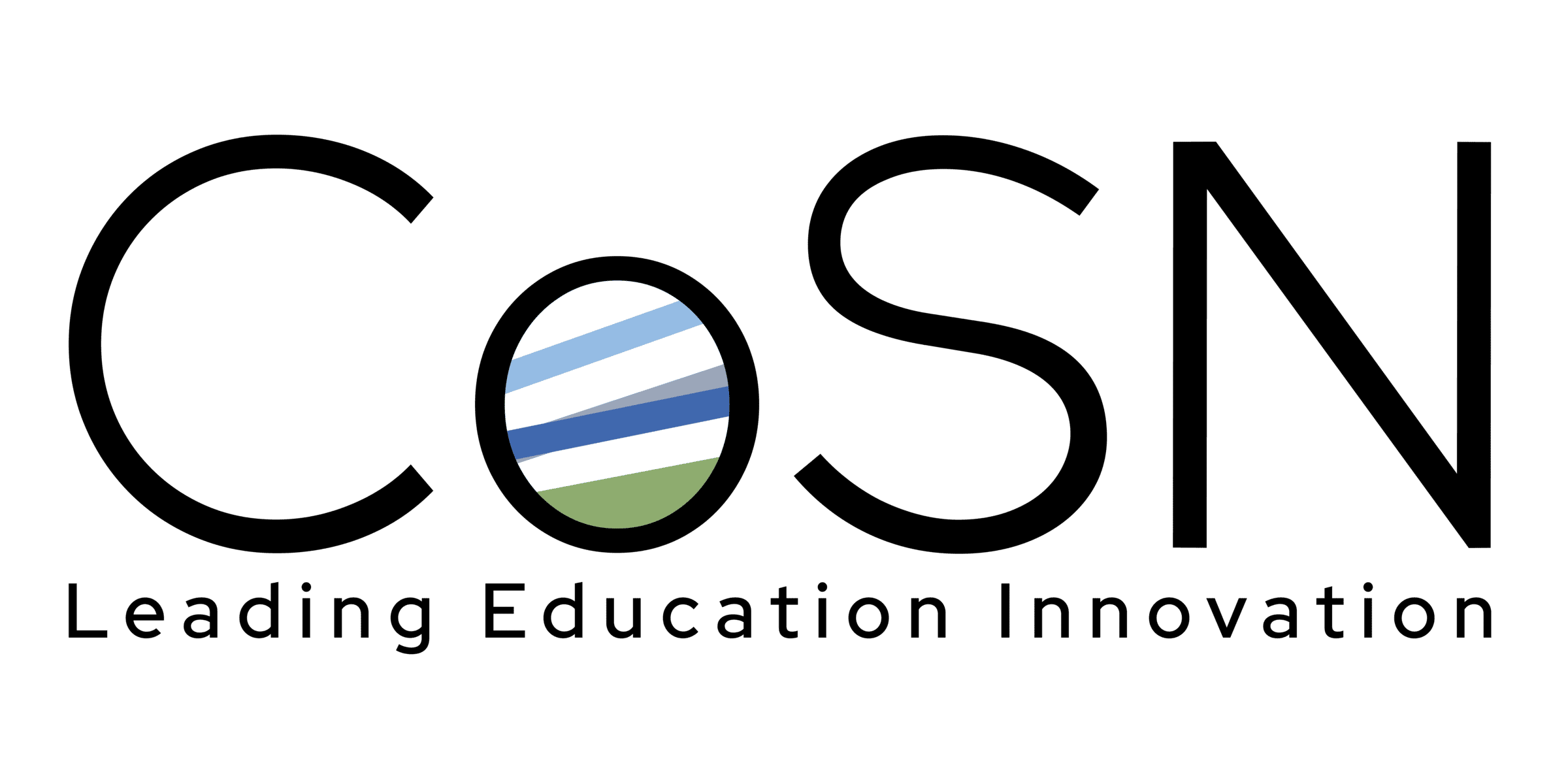About the Building Capacity for Generative AI in K-12 Education Project
The Association of Educational Service Agencies (AESA) and The Consortium for School Networking (CoSN), in partnership with SETDA and AASA, The School Superintendents Association, are launching an exciting initiative to help K-12 education leaders navigate the complex landscape of generative AI (Gen AI). The Building Capacity for Generative AI in K-12 Education Project aims to help school districts of all sizes assess their readiness for generative AI implementation and develop actionable roadmaps aligned with their instructional and operational objectives.
Regional Trainer Role
In order to ensure training availability across as broad a geographic region as possible, we are launching a second call for applications for Regional Trainers in states where we are still building our training network. We expect to bring on 20-25 additional Regional Trainers.
As a Regional Trainer, you will receive specialized training to deliver high-quality professional development in your region. You will lead hands-on sessions using the CoSN/CGCS K-12 Gen AI Maturity Tool, guiding collaborative planning and helping districts make informed decisions about generative AI adoption based on their unique size, demographics, resources, and needs.
Resources for Applicants
- Regional Trainer FAQ v1.0
- Regional Trainer Information Session Presentation Slides
- Regional Trainer Information Session - March 11
- Regional Trainer Information Session - March 12
Targeted States
Applicants from the following states are eligible and encouraged to apply:
- Alaska
- Arizona
- Arkansas
- Colorado
- Florida
- Mississippi
- Montana
- New Jersey
- North Carolina
- North Dakota
- Rhode Island
- South Carolina
- South Dakota
- Tennessee
- Utah
- West Virginia
- Wyoming
Overview of the Training Content
The core content for the training is the CoSN/CGCS K-12 Gen AI Maturity Tool, a rubric-based model that school districts can use to evaluate their readiness to leverage gen AI tools across seven domains: Leadership, Operations, Technology, Data, Security, Legal/Risk, and Academic AI Literacy.
The tool is designed to encourage districts to think cross-functionally and holistically, and outlines concrete actions they can take to move from ideation to implementation.
As a Regional Trainer, your role will be to help guide districts through a four-step process:
- Evaluating their current readiness level across the multiple domains.
- Identifying and prioritizing target areas for implementing gen AI in ways that are aligned with the district’s mission, values, and operational and instructional goals.
- Formulating a detailed problem statement that includes a theory of change.
- Developing a six to twelve-month roadmap for implementing steps to progress from their current to their target readiness level.
Depending on the scope and complexity of the target areas, the timeframe for school districts to complete the steps outlined above may range from six months to two years or more. This is not a “one and done” training. The role of the Regional Trainer is to equip districts with a clear framework and set of tools to begin this work, and then, ideally, to continue offering support and guidance as districts move through the full cycle of evaluation, prioritization, and implementation.
Given this, we are especially interested in applications from education professionals with the qualifications outlined in these next sections.
Required Knowledge, Skills, and Experience
- Current employee of / currently affiliated with an education service agency or state education agency located in one of the states listed above.
- Proven experience in delivering professional development to K-12 leaders.
- Familiarity with facilitation techniques tailored to adult learners.
- Ability to engage and motivate adult learners through interactive and relevant training sessions.
- Previous work with and an understanding of Educational Service Agencies (ESAs) or K-12 school districts.
- An understanding of district-level challenges and strategies for technology implementation.
- Proficiency in generative AI and emerging technologies relevant to education.
Preferred Knowledge, Skills, and Experience
- Knowledge of AI policies, infrastructure requirements, and instructional practices.
- Familiarity with AI-related organizational use cases for operational efficiency.
- Experience in organizational planning and training at the school district level.
- Familiarity and fluency with the CoSN/CGCS K-12 Gen AI Maturity Tool.
CoSN is committed to fostering a diverse and inclusive team of trainers for this initiative and welcomes applications from individuals of all backgrounds, experiences, and perspectives. CoSN believes that diversity enriches its efforts and ensures broader, more equitable outcomes for school districts nationwide. Individuals with the qualifications and passion for this role are encouraged to apply.
Organizational Affiliation
To qualify as a Regional Trainer, you must:
- Be a current Education Service Agency (ESA) employee or have an active training contract with an ESA.
Responsibilities of the Regional Trainer Role
- Attend an in-person Train-the-Trainer session.
- Complete required pre- and post-training activities and assignments.
- Participate in virtual meetings and coaching sessions.
- Deliver training sessions to local school districts following successful completion of the Train-the-Trainer event and post-event assignments.
- Gather and report participant feedback using evaluation materials provided by CoSN and AESA.
- Work with your ESA to develop and implement post-training support strategies that help ensure school districts succeed in their generative AI readiness and implementation efforts.
Responsibilities of Your Organization
- Release you to participate in the Train-the-Trainer session and related pre- and post-training activities.
- Allow time for your participation in virtual training and coaching sessions to support your ongoing development.
With regard to the Local Trainings, we ask that organizations:
- Handle marketing for the training (a packet of communications materials will be provided).
- Handle logistics and registration for district training sessions.
- Collect and process training fees from participating districts.
- Provide required program data and feedback to CoSN and AESA.
Individual and Organizational Benefits of Participating as a Regional Trainer
Becoming a Regional Trainer offers unique professional and organizational advantages. You’ll be part of a national network of trainers, exchanging insights, refining best practices, and sharing resources, while also deepening your training expertise. Through this experience, you’ll gain deeper insight into the complex, cross-functional considerations school districts must address to integrate AI successfully, positioning yourself and your organization as a leader in this rapidly changing field.
Following successful completion of training, Regional Trainers will have a limited license to deliver the training to local school districts through the ESA with which they are employed or affiliated, with their organization retaining a portion of the revenue generated from these trainings. In addition, the organizations with which Regional Trainers are affiliated have the option of offering fee-for-service support following delivery of the core training, such as coaching, implementation support or other professional development. This allows organizations to build on the training and creates additional value for districts.
As generative AI continues to evolve rapidly, school districts will face increasing challenges and questions about how to navigate this dynamic landscape. ESAs equipped to provide quality training and strategic guidance will be well-positioned to meet these growing demands, offering a high return on investment through both revenue generation and the value of supporting their districts' success.
Cost to Participate
The cost to participate in the Building Capacity for Generative AI in K-12 Education program as a Regional Trainer is $1,500, which includes:
- Participation in the in-person Train-the-Trainer session.
- Access to ongoing coaching and mentoring to support your development.
- A Regional Trainer credential, granting a limited license to deliver the training content to school districts in your area.
- The opportunity to generate revenue by offering training sessions through your affiliated ESA.
Video Sample
To be considered for a Regional Trainer role, you must submit a video sample that highlights your training abilities. This is a required part of the application.
Please consider the following guidelines in selecting or preparing your video sample:
Video Content Expectations
The video should showcase your expertise in training adult learners, demonstrating best practices for engagement, comprehension, and retention. Videos in which you are visible on screen while presenting, ideally full-screen rather than in a small window during a screen share, are preferred.
Preferred Content Style
Videos that highlight how you would present and guide a discussion on a complex topic are preferred over videos of edtech tool demonstrations/training. Where possible, include interaction with adult learners, such as leading a discussion or Q&A segments.
Submission Guidelines
The video should be between 3 to 5 minutes long and must not exceed 10 minutes. If your video is longer than 10 minutes, you must either edit it to highlight the sections you'd like reviewed or provide timestamps in the optional question section of the application form. You may submit either a previously recorded training excerpt or create a new recording specifically for this application. The presentation can be on any topic and does not need to relate to AI. Please ensure the audio quality is clear, as videos with poor sound will not be helpful.
Organizational Return on Investment
The example below illustrates the potential revenue that organizations affiliated with Regional Trainers could generate by offering local trainings. By leveraging CoSN membership discounts, organizations can offset costs while providing high-value professional development to their districts.
More details on revenue models, licensing fees, and cost structures are discussed in the information sessions. We recommend reviewing the recordings linked above.
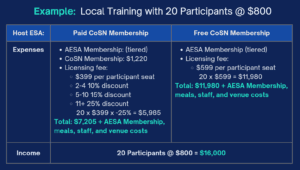
Lead Trainer Role
We are seeking 10-20 distinguished Lead Trainers to spearhead this initiative. As a Lead Trainer, you will train and mentor a cohort of Regional Trainers, who will subsequently be responsible for delivering training to school districts nationwide. Your leadership will be instrumental in this effort to guide education leaders toward responsible and effective generative AI integration.
Individual and Organizational Benefits of Participating as a Lead Trainer
Becoming a Lead Trainer offers unique professional and organizational advantages. Lead Trainers will gain expertise in facilitating a rigorous process of assessing readiness and creating actionable roadmaps for integrating generative AI into K-12 education and operations, an area of growing importance. Following certification, Lead Trainers will have a limited license to deliver the training to local school districts through the ESA or SEA with which they are employed or affiliated, with their organization retaining a substantial portion of the revenue generated from these trainings. As generative AI continues to evolve rapidly, school districts will face increasing challenges and questions about how to navigate this dynamic landscape. ESAs and SEAs equipped to provide quality training and strategic guidance will be well-positioned to meet these growing demands, offering a high return on investment through both revenue generation and the value of supporting their districts' success.
Responsibilities of the Lead Trainer Role
- Participate in a 1.5 day training from March 19-20, 2025, to be held in Milwaukee, WI. The training will cover foundational concepts of generative AI, including ethical considerations, data privacy, and Gen AI’s impact on teaching and learning. Participants will be introduced to the CoSN/CGCS K-12 Gen AI Maturity Tool, with demonstrations on conducting readiness assessments and interpreting results to align with district goals. The program will also include an overview of the train-the-trainer syllabus, facilitation guides, online course resources, and best practices for effective training delivery, alongside a walkthrough of the comprehensive training resource library.
- Facilitate a minimum of one regional train-the-trainer sessions, to be scheduled between April 1 and June 30, 2025. Each event requires a 3-day commitment (1 day for onsite prep followed by 1.5 days of training). You will be responsible for training between 10-20 participants.
- Facilitate pre-work activities prior to the train-the-trainer session(s).
- Provide ongoing support to training participants for six months following the train-the-trainer session(s). This support may include virtual office hours, periodic coaching calls, email-based mentoring, and access to a dedicated discussion forum. Further details on the structure and frequency of support will be outlined during the program's orientation.
- Gather feedback from training participants and provide feedback to CoSN and AESA. Evaluation materials will be provided.
Estimated Commitment: Lead Trainers should expect to commit approximately 225 hours between March and December 2025, with the most intensive period occurring during the first four months (March-June 2025).
Responsibilities of Your Organization
- Agree to release you to participate as a Lead Trainer from March through December 2025, including:
- Attendance at the 1.5-day Lead Trainer training in Milwaukee, WI (March 19-20, 2025)
- Delivery of at least one regional training session between April-June 2025
- Time for preparation, pre-work facilitation, and post-training support
- Support your role in providing six months of post-training support to Regional Trainers
Upon successful completion of the Lead Trainer training, your organization also has the option of offering the training to school districts in your area, led by you or a Regional Trainer. We ask that organizations:
- Handle marketing for the training (a packet of communications materials will be provided).
- Handle logistics and registration for district training sessions.
- Collect and process training fees from participating districts.
- Provide required program data and feedback to CoSN and AESA.
Required Knowledge, Skills, and Experience
- Current employee of / currently affiliated with an education service agency or state education agency.
- Proven experience in delivering professional development to K-12 leaders.
- Familiarity with facilitation techniques tailored to adult learners.
- Ability to engage and motivate adult learners through interactive and relevant training sessions.
- Previous work with and an understanding of Educational Service Agencies (ESAs) or K-12 school districts.
- An understanding of district-level challenges and strategies for technology implementation.
- Proficiency in emerging technologies relevant to education.
Preferred Knowledge, Skills, and Experience
- Knowledge of AI policies, infrastructure requirements, and instructional practices.
- Familiarity with AI-related organizational use cases for operational efficiency.
- Experience in organizational planning and training at the school district level.
- Familiarity and fluency with the CoSN/CGCS K-12 Gen AI Maturity Tool.
CoSN is committed to fostering a diverse and inclusive team of trainers for this initiative and welcomes applications from individuals of all backgrounds, experiences, and perspectives. CoSN believes that diversity enriches its efforts and ensures broader, more equitable outcomes for school districts nationwide. Individuals with the qualifications and passion for this role are encouraged to apply.
Resources for Applicants
This FAQ contains the most up-to-date information about the Lead Trainer role and other project details. Please be sure to review this document, as details about the role continue to be defined in response to applicant questions and feedback.
Leader Trainer Information Session Slide Presentation
Take a Sneak Peek at Our Most Recent Session in Minnesota!
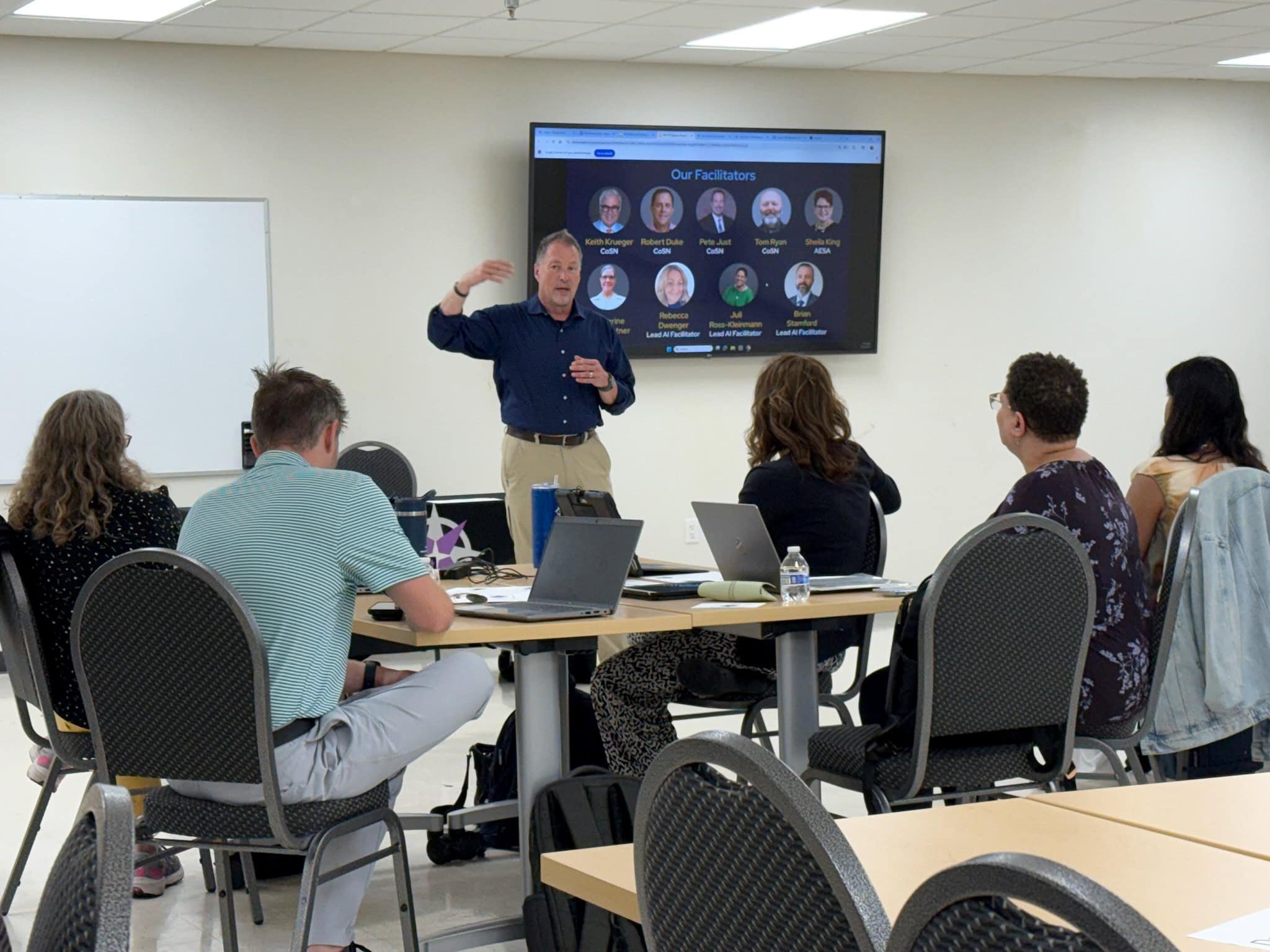
Application Process
To apply for the Regional Trainer Role:
Complete the online application form.
You will be asked to submit your resume, two recommendation letters, and a brief training presentation video (details in the application).
Application Deadline: Apply soon! Applications are reviewed on a rolling basis, but early submission is encouraged to allow time for review before the upcoming in-person Train-the-Trainer session scheduled for February 18-20, 2026. Location tbd.
Information Sessions
To learn more about the Regional Trainer role, we invite you to review the recordings of the information sessions:
Thank You to Our Supporting Partners

